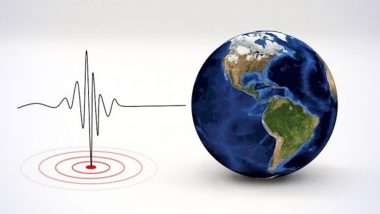Shillong, September 19: A medium-intensity earthquake of magnitude 3.8 hit Meghalaya on Sunday. According to the National Centre for Seismology (NCS), the quake occurred 80 km north of Tura in the northeastern state at 8:18 pm today, the NCS informed. However, there was no report of any damage or loss of property due to the quake. The northeast region of India has been witnessing frequent earthquakes over the last few months.
The seismologists consider the mountainous northeast region of India as the sixth major earthquake-prone belt in the world. In the last week, an earthquake measuring 4.3 on the Richter scale occurred in Jammu and Kashmir with its epicentre at India-Pakistan border region. Kashmir is situated in a highly vulnerable seismological region. What is Earthquake? What Are The Causes and Effects of Seismic Waves? Know Everything About This Natural Occurrence.
Here's the tweet:
Earthquake of Magnitude:3.8, Occurred on 19-09-2020, 20:18:38 IST, Lat: 26.24 & Long: 90.15, Depth: 10 Km ,Location: 80km N of Tura, Meghalaya, Indiafor more information https://t.co/yL01SaRNpS pic.twitter.com/89LJR0wH7V
— National Centre for Seismology (@NCS_Earthquake) September 19, 2020
On Sunday, reports inform researchers in the US have developed a novel method to determine how fast the Indian Ocean is warming by analysing the sound from seabed earthquakes. This is a new development that may lead to a relatively low-cost technique to monitor water temperatures in all of the oceans. A recent study, published in the journal Science, the scientists used existing seismic monitoring equipment, as well as historic data on earthquakes, to determine how much the temperature of the ocean has altered, and continues changing, even at depths that are normally out of the reach of conventional tools.
(The above story first appeared on LatestLY on Sep 19, 2020 09:13 PM IST. For more news and updates on politics, world, sports, entertainment and lifestyle, log on to our website latestly.com).













 Quickly
Quickly




















